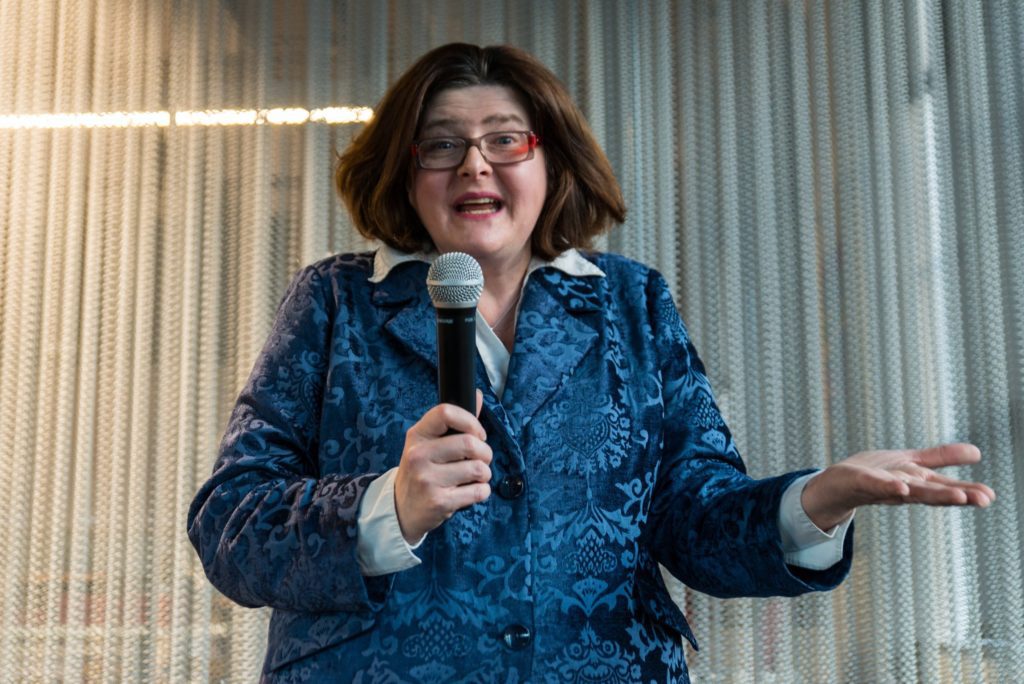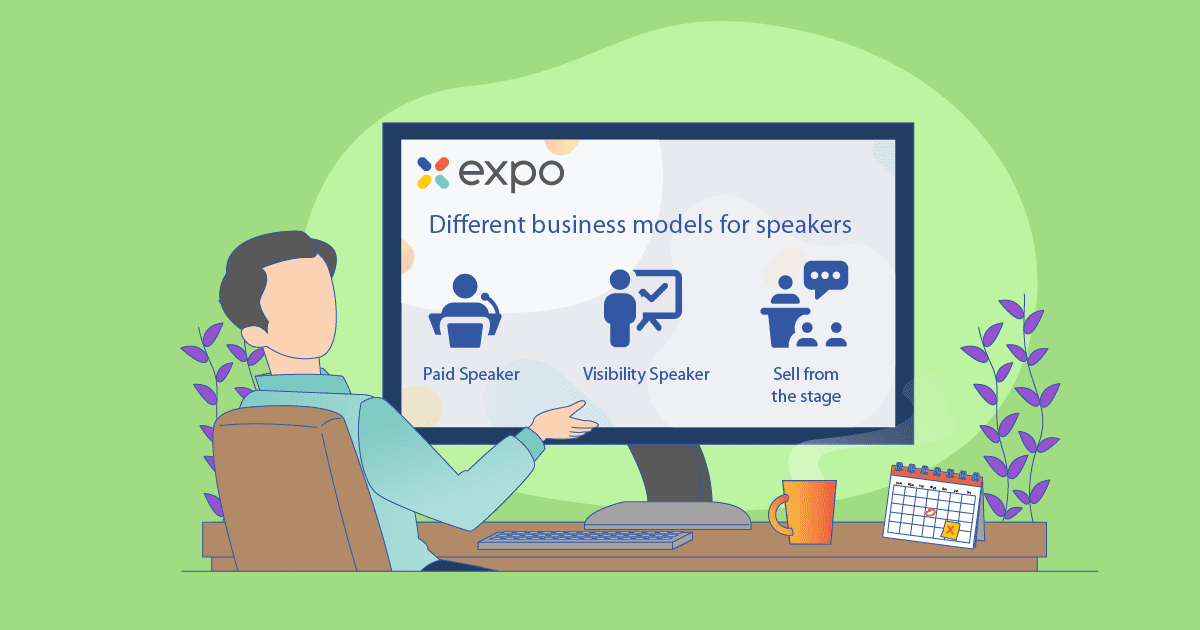“I love seeing speakers that change the way we think […] They are experts, they have thought about something, they bring their own view of the world – to you – and it changes how you think about the world.”
That was just one of Bobbie Carlton’s many inspiring insights at our recent webinar – Finding the perfect speaker: Where to start and what to know.

Carlton has spoken at TEDx and the United Nations and is the founder of Innovation Women – a “visibility bureau” “which helps awesome speakers and subject experts, who just happen to be women,” take control of their speaking careers. Innovation Women also works to create more diversity at events, and remake the “all-male, pale, and stale” panels we so often see.
Carlton provided enormous expertise on everything from lifting diverse voices, where to find diverse speakers, what to pay speakers, and much more. We truly enjoyed talking to Carlton and couldn’t be more pleased to bring you this recap. So dig in, it’s a good one!
Want to skip the recap and watch the webinar instead? Watch the replay here!

How can organizers create more diversity at their events?
“It’s hugely important as an event manager to produce events that showcase the broad range of the community, not just one person, or one type of person. The more diverse people you have on stage, the more interesting conversations you have on that stage,” says Carlton.
Here are her top tips to make that happen:
Think panel by panel: Panels are your first impression. They set the tone for the marketing and are what your audience sees when they walk into the venue. Each panel needs to include diverse voices for your audience to feel fully represented throughout the entire event.
Reach out personally: Organizers should reach out to organizations for underrepresented professionals, such as Women Who Code. It also helps to connect personally with potential speakers. Start with people in your network, then expand as you meet more people.
Look less C-suite: Event speakers are often the same executives that are already on the speaking circuit. This is why organizers should look beyond the C-suit, and reach out to directors, managers, and other experts that can bring a new perspective to the event stage.

What are the various types of speaker business models?
“If you understand a speaker’s business model (how they make money), you can choose the right speaker or right kind of speaker for your kind of opportunity or your kind of event,” say’s Carlton.
These are her three main speaker models:
Paid speakers: These are people who get paid to speak professionally. They are keynote speakers, featured speakers/panelists, or there to put on a workshop. They are motivational and entertaining, and often engage the audience by sharing their specific, personal experiences.
Visibility speakers: These are people who are speaking to increase the visibility of a company and themselves. They are thought leaders, and industry experts, and are looking for business or career growth from the experience.
Sell from stage speakers: These are people who are looking to sell a product or service to the people directly in the audience. Oftentimes events don’t want speakers to sell from the stage, but there are times when this is appropriate at specific events.

What should we be paying speakers?
“I would love to see some standardization in the events world around speaker prices. I think it would be absolutely amazing,” says Carlton.
She went on to add that in one of her surveys she found almost half of event managers don’t pay speakers at all, and about 42 percent stated that they pay only “some” speakers.
To help add some clarity to speaker payment, Carlton has a few points to consider:
Think about the value they bring: Will your speaker bring a big following or have an influence on the public conversation? The speaker is the reason people are there, so it’s up to you to decide what payment is within your budget and equals the value they bring to your event.
Paying speakers lifts new voices: Speakers are often paid simply because they’ve spoken at other events before, while new speakers are not offered compensation. (Paid speakers are also more often men, and not people of color.)
This creates a situation where women and diverse voices have to spend their own money and time to get the same exposure that others are getting paid for. Organizers can break this cycle by paying all speakers that add value to the event, regardless of past experience.

What are a few realistic things to ask speakers to do?
“A lot of (speakers) are more than happy to do promotion, to put things into their social media, to put things into their lists, because it is also promoting them as a speaker,” says Carlton.
Here are a few of her best promotion requests:
Video content: Video rules the internet. Ask your speaker if they would make a short video/story/reel to help you promote the event.
Social media posts: A social media post goes straight to the speaker’s followers. These are people that are already interested in seeing and connecting with that person.
Email blast: Emails work, and oftentimes speakers have extensive lists that they can reach out to.
Articles: If you have a blog (like this one!) and your speaker likes to write, an article is a fantastic way to jump-start the conversation before the event.

How can you make sure they are the right speaker?
“Talk to them about their expectations, talk to them about how an audience feels. What are the takeaways? Do they have a particular feeling that they evoke in that audience? These are things that a good speaker should be able to tell you,” says Carlton.
She also added a few more ways to make sure you have the perfect speaker:
Watch video: You need to watch a full video of the speaker’s presentation. Not a sizzle reel (that’s just a highlight of all their best moments). You want to know what this person is really like on stage, in full, without any editing magic.
Note: TED/TEDx talks may not be their normal presentation, so try to find a second source to see why they do with a little more time.
Consider timing: When will this person be on the stage? Are you looking for someone to get everyone pumped up in the morning or at the event close? Or do you want a more meditative, introspective speaker? It all comes down to what you need.
Stay ahead of the curve: Events often hire the same speaker over and over and attendees can get bored with them. Look for new voices and talent to pique more interest in your event.
Where can organizers find speakers?
“A lot of us turn to Linked-in, we look at news coverage, who’s making headlines in our industry – looking for the experts,” says Carlton.
She went on to list a few key places to look for speakers:
Top 10 lists: Every industry has lists of people who are innovating and getting noticed amongst their peers. These lists are also becoming more diverse and inclusive.
Linked-in/Professional groups on social media: Professional networks on Linked-in and other social media sites are a perfect way to connect with experts and new voices.
Ask other speakers: Speakers know good speakers. Ask who is inspiring them right now and who they are excited about.
How do we prep speakers?
“Really good professional speakers will always show up early. They will build in a time to get there, to make sure you are not worried that they will show up late,” says Carlton.
But there are some key ways to prep them:
Don’t bury them in information: Speakers do not need to know where to set up a booth or random attendee info or be on tons of email lists.
Make sure they understand the platform: Event tech is constantly evolving, make sure the speaker understands the platform you are using.
Keep speaker dinners casual: Some speakers will want to grab dinner. Other speakers will want to spend the night prepping, or sleeping! Bottom line, any get-togethers should be optional.
All comes down to good communication: Prep calls, tech rehearsals, check-ins. Just make sure everyone is on the same page.

A few more tips!
Carlton mentioned a few more amazing tips and suggestions that all organizers should know.
Give your speakers the respect they deserve: Don’t treat them like one group. They’ve done the work, had a long career, and all have expertise. These are the things that make your event better. Make sure they know you respect what they bring to the table.
Create a strategy for if things don’t work out as planned: If a speaker couldn’t make it, and your diverse panel is no longer diverse and poorly received by attendees – you want a plan for that. Maybe you’ll have someone who can give up a seat. Or simply make sure to publicly own the issue and talk about it honestly. Either way, have a plan.
Have a speaker limit on panels: Carlton says 3 speakers = 30 mins. Any more speakers and they won’t get time to fully express themselves.
Host a pre-panel chat: Panelists should meet and chat about their thoughts and views before going on stage. But make sure to let speakers know that the audience needs to be brought up to speed on any inside jokes from the pre-panel chat.
Diversity means many things: Diversity is culture, different socio-economic groups, people with disabilities, and unique life experiences. Lift up everyone.
Finding the perfect speaker is about knowing what to look for.
Finding event speakers can seem like a daunting task. When you know what to look for, you’ll be able to find and decide on the perfect people for your event.
Thinking panel by panel is a great way to always have diverse panels on stage. Understanding the different speaker business models will help you find the right speaker for the right event. And try to find speakers that are new, diverse, and exciting. These are the people that will create the most interesting conversation. Which is what events are all about anyways!
If you’d like to see the full video recap, just click here to watch!



